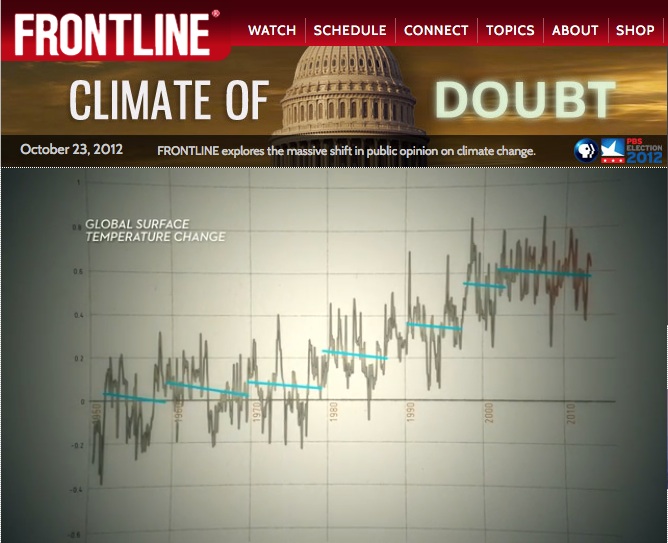Climate of Doubt Shines a Light on the Climate Denial Movement
Posted on 27 October 2012 by dana1981
As we previewed earlier this week, the US Public Broadcasting Station (PBS) Frontline aired a program called Climate of Doubt on October 23rd, 2012. For those who missed it, you can (and should) watch the program here (also on YouTube):
Watch Climate of Doubt on PBS. See more from FRONTLINE.
Climate of Doubt was an excellent, well-researched, insightful, informative, revealing, and worrying program, investigating why the USA is further away from serious climate action today than we were five years ago. John Hockenberry does a masterful job interviewing a number of prominent figures in the climate denial movement, including Fred Singer, Christopher Monckton, and James Taylor, essentially giving them the opportunity to defend their behavior, which often resulted in revealing their underlying motivations.
For anyone wondering why climate denial is so much more prevalent in the USA than most of the rest of the world, Climate of Doubt is a must-see program, detailing the political and misinformation messaging tactics of the climate contrarian movement, as well as their secretive funding sources. The two main contrarian strategies interweaved throughout the program involved denying the scientific consensus on human-caused global warming, and exaggerating climate uncertainties. While the contrarians and "skeptics" have long ago lost the scientific battle, they have thus far won the public relations battle through an orchestrated misinformation campaign, and clearly take great pride in having successfully delayed implementation of any significant climate policy and ushered in a temporary era of climate silence in American politics. The main lesson to be learned here is that communicating the scientific consensus to the American public to refute the 'no consensus' myth should be climate realists' #1 priority - more on this in future blog posts.
The program also interviews a number of prominent climate scientists, including Gavin Schmidt, Katharine Hayhoe, and Andrew Dessler. These scientists discussed the intimidation tactics (which we at Skeptical Science are somewhat familiar with) and misinformation strategies of the climate denial movement. One of these strategies has been frequently dissected here at Skeptical Science. As the program put it (at approximately the 18 minute mark),
"Scientists have a name for this; they call it 'Going Down the Up Escalator.'"
Skeptical Science readers will of course recognize this graphic and Escalator title:
The program could also have benefitted from a discussion of the results of Foster and Rahmstorf (2011), who used multiple linear regression to statistically remove various short-term surface temperature influences, revealing the underlying steady long-term human-caused warming trend.
Perhaps the one flaw in the program was that it created the impression that the climate contrarians have won the policy battle. As Chris Mooney notes, while this is true over the 5-year window examined in the program, their significant political gains have only occurred over the past few years, and American public acceptance of the reality of human-caused global warming has already begun to rebound. Although some have criticized the program for not going into greater depth about the major consequences of climate change that we face as a result of our climate inaction, we feel that Frontline made the best use of the limited time available for the program, and we can only hope that follow-up programs of this quality will be forthcoming.
The effectiveness of the program is particularly clearn in light of the fact that the climate denialists are already in full blown damage control mode, with no less than four response blog posts from various right-wing think tanks published at a major player in the climate denial movement, WattsUpWithThat, over just a span of two days. We will have more on these attempts at denial damage control in the near future.
Overall if you haven't watched the program you should, and if you watched it you should do so again, but invite a friend, relative, or neighbor to join you in order to spread the word. Climate of Doubt shines a light on the motivations and tactics of the climate denial movement, and while they have very little in the way of constructive scientific contributions, we can learn a lot from their messaging strategies.
The science is clear; these are the people fighting to destroy a liveable climate for future generations. We can't let them succeed.































 Arguments
Arguments

































[DB] Part of your problem is insisting on arguing from ignorance. You refer to AR3 while the AR4 has been out for 5 years and AR5 is being drafted.
At Skeptical Science, thousands of threads exist dealing with virtually everything to do with climate science...and the denial of it by skeptics and the like. This thread specifically deals with Climate of Doubt Shines a Light on the Climate Denial Movement. If you would care to break up this long comment into more appropriately-specific subjects, utilization of the Search function will certainly locate for you specific threads where those bits will be more on-topic. And likely have already been dealt with, either by the OP of those threads or in the comment threads to the posts.
Also, please acquaint yourself with the Comments Policy of this website (linky adjacent to every comments box).